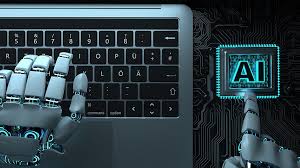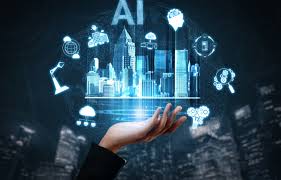AI and Machine Learning: Key Drivers of Business Change
Introduction
Artificial Intelligence (AI) and Machine Learning (ML) are at the forefront of the technological revolution, transforming industries and reshaping how businesses operate. These cutting-edge technologies are enabling businesses to operate more efficiently, make better decisions, and provide personalized customer experiences. AI and ML are not just trends but fundamental drivers of change, providing organizations with the tools to adapt, innovate, and stay ahead of the competition. In this article, we will explore how AI and ML are revolutionizing business operations and driving key changes across industries.
What is AI and Machine Learning?
Before diving into their impact, it's important to define what AI and Machine Learning are.
Artificial Intelligence (AI) refers to the simulation of human intelligence processes by machines, especially computer systems. AI encompasses a wide range of technologies that can perform tasks typically requiring human intelligence, such as decision-making, problem-solving, understanding language, and even visual perception.
Machine Learning (ML), a subset of AI, is the ability of machines to learn from data and improve their performance over time without being explicitly programmed. In ML, algorithms are used to identify patterns and make predictions based on the input data.
Together, AI and ML are transforming how businesses interact with customers, process data, and even make strategic decisions.
AI and ML in Automating Business Operations
One of the most significant contributions of AI and ML is automation. In the past, many business processes required manual intervention, which often led to inefficiencies, errors, and delays. With the advent of AI and ML, businesses can now automate repetitive tasks, streamline workflows, and eliminate human error.
For example, AI-powered chatbots and virtual assistants have become essential tools for customer service. These systems can handle routine inquiries, provide support, and even troubleshoot common problems without requiring human agents to step in. This leads to faster response times, improved customer satisfaction, and the ability for human agents to focus on more complex tasks.
In supply chain management, AI and ML help businesses optimize inventory levels, forecast demand, and improve logistics by predicting the most efficient delivery routes. Automation of these processes not only saves time but also reduces operational costs and improves overall efficiency.
Enhancing Data-Driven Decision Making
Data is often referred to as the "new oil" in the modern business world, and AI and ML are the tools that help organizations harness its full potential. Businesses today generate vast amounts of data from various sources, including customer transactions, website interactions, and social media. Analyzing this data manually is impractical, which is where AI and ML come in.
With AI and ML, businesses can process and analyze large datasets at speeds that humans cannot match. Machine learning algorithms can identify trends, correlations, and patterns that would be invisible to the naked eye. This data-driven approach allows businesses to make informed decisions, rather than relying on gut feelings or outdated information.
For example, in retail, ML models can analyze customer purchasing behavior to predict future trends, optimize pricing strategies, and recommend personalized products to individual customers. In marketing, AI algorithms can segment customers based on their behaviors and preferences, allowing for targeted advertising and content delivery. The ability to use data to drive decisions helps businesses stay agile and competitive in a fast-paced market.
Improving Customer Experiences with Personalization
Customer experience has become a key differentiator in today's competitive business environment. AI and ML play a significant role in enhancing personalization, allowing companies to deliver more relevant and tailored experiences to their customers.
Machine learning algorithms can analyze vast amounts of data on customer preferences, past behavior, and interactions with the brand. This allows businesses to create personalized experiences, such as product recommendations, targeted marketing campaigns, and even dynamic pricing models. For example, streaming services like Netflix use AI and ML to recommend shows and movies based on individual viewing history, making the user experience more enjoyable and engaging.
Personalization is not limited to retail and entertainment; it spans across industries. In healthcare, AI is used to provide personalized treatment plans based on a patient’s medical history and genetic data. In finance, AI-powered systems help create customized investment strategies based on an individual's risk tolerance and financial goals. This level of personalization helps businesses build stronger relationships with their customers, fostering loyalty and driving revenue growth.
Predictive Analytics for Business Forecasting
Predictive analytics powered by AI and ML enables businesses to forecast future trends, sales, and consumer behaviors with a high degree of accuracy. By analyzing historical data and identifying patterns, AI models can predict future outcomes and help businesses make proactive decisions.
For instance, in the financial sector, AI algorithms can predict market trends, enabling businesses to make better investment decisions. In retail, predictive analytics can forecast demand, helping companies optimize inventory and reduce the risk of stockouts or overstocking. In manufacturing, AI can predict equipment failures, enabling businesses to perform preventive maintenance and avoid costly downtime.
Predictive analytics also helps businesses understand and anticipate customer needs, allowing for the development of new products and services that are likely to be in high demand. This level of forecasting helps businesses stay competitive by responding to market changes and consumer preferences more effectively.
AI and Machine Learning in Risk Management
Managing risk is another area where AI and ML are having a profound impact. Traditional risk management methods often rely on human judgment and historical data, which can be limiting. AI and ML, however, can analyze vast amounts of real-time data and assess risk in ways that were not possible before.

In finance, AI can detect fraudulent transactions by recognizing patterns that deviate from normal behavior. In insurance, AI models can assess the risk associated with an individual or company by analyzing a variety of factors, such as health data, driving behavior, or historical claims. By using machine learning algorithms, businesses can identify potential risks and take steps to mitigate them before they lead to financial loss.
AI and ML also enhance cybersecurity. Machine learning algorithms can detect unusual network activity, identify potential threats, and automatically respond to security breaches. This ability to predict and respond to threats in real time helps businesses protect sensitive information and prevent data breaches.
The Future of AI and Machine Learning in Business
AI and machine learning are continually evolving, and their role in business is expected to grow exponentially in the coming years. As businesses continue to adopt these technologies, we can expect even more automation, more personalized experiences, and more advanced predictive capabilities.
The integration of AI with other emerging technologies, such as the Internet of Things (IoT) and blockchain, will unlock new opportunities for innovation. For example, AI-powered IoT devices can collect data in real time and use machine learning algorithms to optimize operations, such as energy consumption, logistics, and manufacturing processes.
Furthermore, the ethical implications of AI and ML will become increasingly important. As these technologies continue to shape business practices, companies will need to address concerns related to data privacy, algorithmic bias, and transparency. Ensuring that AI and ML are used responsibly will be crucial for maintaining public trust and fostering sustainable growth.
Conclusion
AI and machine learning are transforming the way businesses operate, offering numerous opportunities for improvement in efficiency, decision-making, and customer experience. These technologies are driving innovation and enabling businesses to adapt to a rapidly changing market. By automating processes, enhancing data-driven decision-making, personalizing experiences, and improving risk management, AI and ML are setting the stage for a new era in business. Companies that embrace these technologies will be better equipped to thrive in an increasingly competitive and data-driven world.


You must be logged in to post a comment.